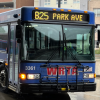Boston Mayor Marty Walsh called the protests that blocked I-93 on Thursday dangerous, and he said he was not happy about it. Countless commuters who were stuck in traffic weren’t happy either...
But blocking traffic to make a point of protest is nothing new. Brandon Terry is a fellow at Harvard who focuses on African American history and the civil rights movement. When he heard about yesterday’s protest, he thought of New York in 1964. A group of activists from CORE, the Congress of Racial Equality, decided to block the highways going to the World’s Fair.
“These were the newly constructed Robert Moses highways that were supposed to lead everyone to the gleaming exemplar of the greatness of American civilization in 1964 at the world’s fair. And their plan was to recruit a group of motorists to deliberately run out of gas on the highway and block all the highways,” said Terry.
Malcolm X told NBC News that he supported the idea.
“Well, I can think that nothing would bring the spotlight of the world or the attention of the world upon the human rights violations of the 22 million African Americans more so than tying up traffic that will make it impossible for the fair to open up."
But others in the civil rights movement, like Dr. Martin Luther King, Jr., were against the idea.
"Even though King didn’t come out and criticize it in public, in private he thought it was a misguided tactic. The NAACP thought it was ridiculous,” said Brandon Terry
Ultimately, few cars showed up to stall out on the highways and the protest was largely a failure.
Thursday’s shutdown of I-93 is similar in some ways to that failed protest, said Terry. The problem isn’t the idea of inconveniencing a lot of people, it’s how effective they are as a protest.
“I think the best protests are the ones that teach us about the injustices that they’re trying to attack.”
For example, the sit ins at lunch counters in the 1960s. They clearly showed to the world not only the injustice that black people weren’t allowed to be served, but also that the state was complicit by enforcing those laws. Yesterday’s protest, Terry said, was good at provocation, but didn’t really teach a lesson and have a clear demand.
“What’s not there right now in a lot of the Black Lives Matter Protest, are the connections to pedagogy and politics,” he said.
Terry says this generation doesn’t really react to orderly, sign-waving protesters marching with a permit, like past generations did. So protestors have to do things like shut down 93 to get attention.
“’I think that’s what these protestors are trying to do. And at that level I commend it. I think the difficulty is when you provoke that kind of response but you don’t walk people through how the injustices you’re seeing, you’re calling attention to, really work, and how we can stop them together – that’s when I think you end up being a bit self-defeating.”
Peniel Joseph is a professor of African American history at Tufts University. There is a lesson in the protests, but it’s not covered by what he says is corporate media that’s committed to the status quo, he said.
“They’re not going to tell you, ‘Hey, look, there’s a new civil rights movement, and there’s 170 cities that erupted in protest after Ferguson."
Joseph said many of the local Black Lives Matter groups do have specific policy demands focused on racial profiling and other criminal justice reforms. And he says yesterday’s tactic was an effective one.
“One of the things we have to remember is social protest always inspires both support, but what might be called a backlash. So this happened in the '60s, '70s, '80s, and certainly now. So there’s going to be people very angry about not being able to get to work or being inconvenienced. But I also think they’re just raising the consciousness of everyone that this movement is around and it’s here to stay.”
And, like it or not, that could mean more traffic jams in our future.




